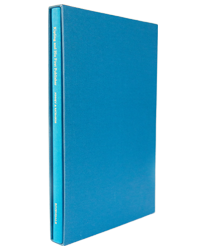PURCHASE
Amazon | AbeBooks.com
Rudyard Kipling: The Books I Leave Behind
Equally adept at humor writing, tales for children, and adventure stories, Rudyard Kipling holds a singular place in the pantheon of great English writers. This book celebrates the Nobel Prize winner’s multifaceted achievements and, with 80 full-color illustrations, underscores the variety and breadth of his printed production. An introductory essay by David Alan Richards, whose extensive Kipling collection is among the finest in the world, traces the challenges and joys of building a Kipling bibliography. Thomas Pinney, emeritus professor of English at Pomona College, contributes an essay on how collecting Kipling reflects the writer’s literary status.
The book is organized chronologically, beginning with Kipling’s birth in India in 1865 and extending to movies, plays, and new editions of his works that have appeared since his death in 1936. The selected items create a time line of his life and popular works, including The Jungle Books and The Just So-Stories. Admirers of Kipling’s genius and lovers of literature in general will appreciate this rare glimpse into his extraordinary world.
Purchase RUDYARD KIPLING: THE BOOKS I LEAVE BEHIND
RUDYARD KIPLING: THE BOOKS I LEAVE BEHIND
IN THE MEDIA
"Kipling: Bard of Two Empires", Retired Men's Association of Greenwich, June 10, 2020
This recording, posted originally on iTunes, is of the author’s remarks at the opening on June 1, 2007, of the exhibition (running through September 15 of that year) in the Beinecke Rare Book & Manuscript Library at Yale University entitled “Rudyard Kipling: The Books I Leave Behind,” items from which are described in the book of the same name, which served as the catalogue to the exhibition.




